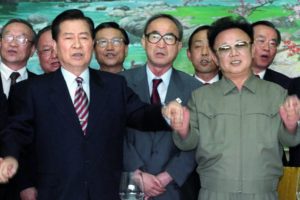Special to WorldTribune.com
 By Donald Kirk
By Donald Kirk
Following is the Preface and the first of several excerpts from a book by WorldTribune columnist Donald Kirk and the Korean author Kim Ki-Sam. The book has generated much interest and controversy in both South Korea and the United States and has been published in Norway, the home of the Nobel Peace Prize.
The authors have been working on the topic of Kim Dae-Jung’s payoffs to North Korea, all in his bid to win the Nobel Peace Prize, since 2006 when Kim Ki-Sam heard that Donald Kirk was researching a biography of the former Korean president.

Ki-Sam, living in central Pennsylvania with his family while seeking asylum in the United States, got in touch with Don in Washington. He wanted to tell him what he knew about the payoffs that preceded the June 2000 North-South Korea Summit at which North Korea’s leader Kim Jong- Il hosted Kim Dae-Jung in Pyongyang.
In a coffee shop in northern Virginia, we had the first of many meetings. Kirk’s biography was initially intended as the usual paean to the accomplishments of the former president. As Kirk went on in research, however, he discovered facts and views that contradicted the conventional encomiums of academicians, missionaries, and others enamored of Kim Dae-Jung, emotionally and intellectually, from his days as a crusader for democratic reforms in South Korea.
With new information from Kim Ki-Sam, Kirk finally completed his book, Korea Betrayed: Kim Dae Jung and Sunshine, published soon after Kim Dae-Jung’s death on Aug. 18, 2009. Shortly before the first anniversary of his passing, Kim Dae-Jung’s voluminous postmortem biography came out at the end of July in 2010. In response, Kim Ki-Sam managed to find a publisher in Korea who was willing to risk reprisals from Korea’s National Intelligence Service (NIS) and the bereaved family and servants of Kim Dae-Jung.
In his book, published in August 2010, Kim Dae-Junggwa Daehanminkukeul Malhanda (My Testimony on Kim Dae Jung and the Republic of Korea), Kim Ki-Sam recounted his eight years’ experience in the agency as well as the revelations that he already had disseminated through the Internet and the media. Within the morass of information that Kim Ki-Sam provided to Kirk, significant portions remained untouched and waiting for exposure. These ranged from the confidential files of the NIS, the possession for which Kim Ki-Sam had toiled as a young officer, to internal NIS memos showing DJ’s extraordinary ego-driven quest for the Nobel that consumed not only much of his own energies but also those of the NIS and eventually the whole country.
On the basis largely of this material, news articles about Korean politics and diplomacy, open source materials, and our own analysis and judgment, we have collaborated on this account of DJ’s pursuit of Nobel glory and the ramifications for the two Koreas and the world. In order to avoid confusion, we refer to ourselves in the third person, notably in the first and last two chapters. And, since so many Korean surnames are the same, we tend to repeat full names. Kim and Lee, the latter sometimes transliterated as Rhee or Yi, are the most common. They are followed by a dozen or so others, including Park/Pak, Baek/Paek, Han/ Hahn, Chang/Jang, and Lim/Im. (Transliteration from the Hangul may vary depending on personal and family wishes and whims.) Exceptions are Kim Dae-Jung, referred to as “DJ,” and Kim Young-s am, “YS,” the Western initials by which they are often known among Koreans and foreigners alike.
Also, to avoid confusion, we capitalize the word “Summit” in all references to the June 2000 North-South Korea Summit between Kim Dae-Jung and Kim Jong-Il. …
Finally, but far from least, we wish to extend our deepest thanks to many friends, contacts, and family members to whom we are most grateful for their patience, support, and understanding. Janet Hinshaw-Thomas not only reviewed the manuscript but provided eight years of legal assistance for Ki-Sam on a pro bono basis in order to gain asylum in the United States for him and his family. Equally important, we wish to acknowledge with gratitude the information provided by “a few anonymous good men” in the NIS, whose assistance was essential in forming this book. Although we cannot name them, we salute them for their honesty, conscience, courage, and patriotism for exposing the truth about the pursuit of an honor achieved at great cost to the people of both Koreas and to the safety and security of Northeast Asia and the rest of the world.
Washington, Seoul April 2013
See: Part 2: South Korean intelligence officer had to fight both Seoul and DHS for asylum, Feb. 12
See: Part 3:Politicized intelligence, South Korean-style, Feb. 20
